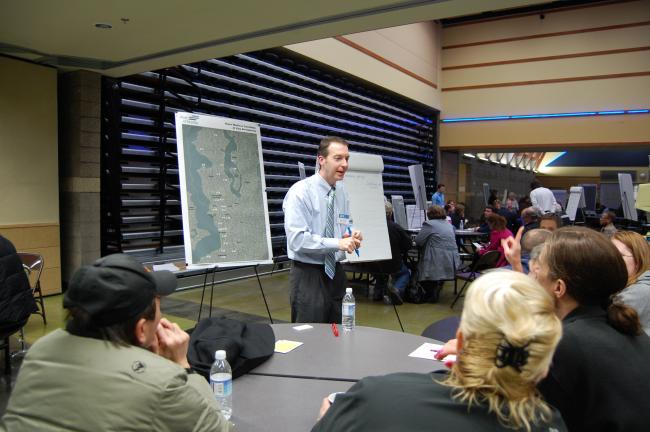Port staffers hear airport noise gripes at Des Moines meeting
Landrum and Brown consultants to the Port of Seattle, invited residents living close to Sea-Tac Airport to share their comments and concerns regarding airport noise, especially in relation to the third runway. The meeting drew about 150 people and was held at Mount Rainier High School in Des Moines.
Thu, 02/25/2010
Got a gripe about airport noise? Port of Seattle staffers say they want to hear about it.
Feb. 24 was the first of six public meetings where the Port of Seattle, partnering with consulting firm Landrum and Brown, invited residents living close to Sea-Tac Airport to share their comments and concerns regarding airport noise, especially in relation to the third runway.
The meeting drew about 150 people and was held at Mount Rainier High School in Des Moines.
It was the first step in what officials estimate to be a year-and-a-half long process of information gathering to set up and submit a proposal that would secure funding from the Federal Aviation Administration to alleviate the noise for residents living around the airport. The planning process is known as a Part 150 study, which is a common project taken on by many airports around the country to improve noise control.
If granted, the federal government would cover about 80 percent of the costs of any noise mitigation projects while the Port would cover the rest.
“[Noise recommendations] have never really been turned down,” said Stan Shepard, director of noise control operations at the Port of Seattle. He said it was highly likely – a “99 percent change” – that the Port would secure funding once their recommendations were made to the federal government.
Officials briefly divided the attendees into a dozen smaller groups to discuss their ideas and complaints to a Port of Seattle official who facilitated each group and wrote concerns on easels.
Among the comments:
“Overhead now (not before).”
“Can’t open windows.”
“Night time, 12-2 a.m. within last year.”
One of the attendees was Normandy Park Mayor George Hadley. He said that he wanted the Port to work on better noise reduction, especially on one particular day of the week.
“[Airplanes] do run-ups on early Sunday morning [and it’s] obnoxious,” he said.
Part 150 study officials say that, in addition to community meetings with residents, they will also gather statistical information from 25 noise-monitoring terminals placed around the airport that will measure noise levels on a 24/7 basis.
The completed study will recommend various policies to the FAA based on the information gathered over the next 18 months, such as changing runway procedures or insulating homes and other structures.
Officials stressed that they could not recommend major policies such as closing an airport or runway, imposing fees or limiting access to the airport.
“Our goal is to move forward and try to find a solution,” said Rob Adams, the project manager from Landrum and Brown, the consulting firm the port has teamed up with for the study. “I don’t want to mislead anyone and make them think we can change the world.”
The next Part 150 public meeting will be held in May or June on a date to be determined. Up to date information is available at http://www.airportsites.net/sea-part150 and comments can be sent to seapart150-comments@landrum-brown.com .


